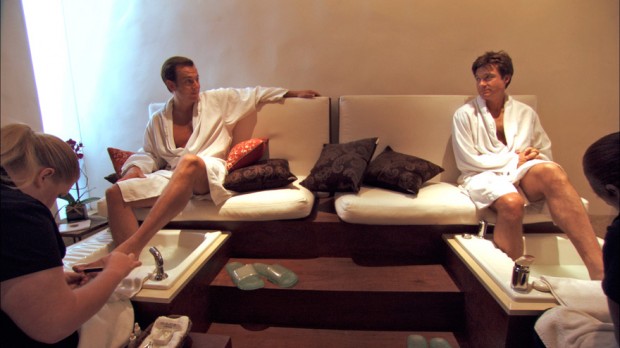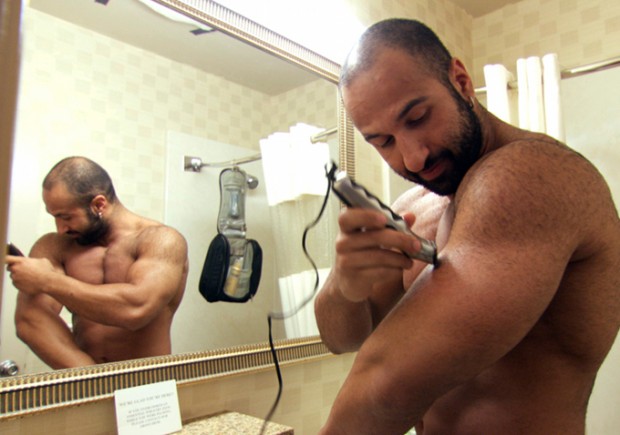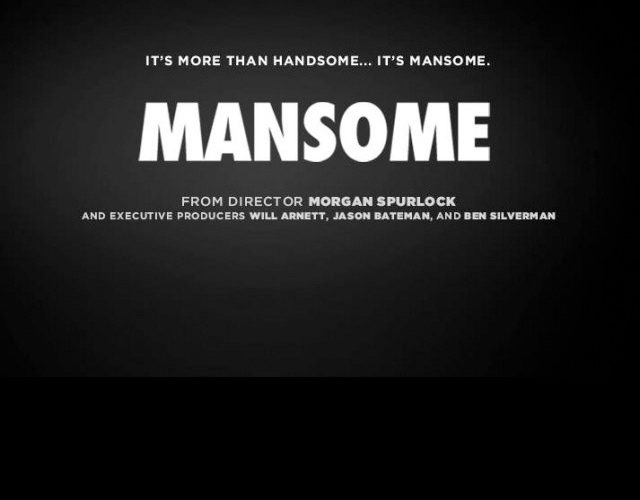Men in the 21st century find themselves at an interesting crossroads. There is a burgeoning awareness of men and the importance of their looks, a burden that was almost exclusively laid at the feet of the fairer sex (at least in modernity, and when talking in broad generalizations). Taking on these traditionally female-branded concerns means that the identity of man is shifting. This question, one that affects men across our great nation, deserves an educational and thorough documentary to explore why this movement is happening, what its possible consequences are, and reasoning out whether this is for good, for ill, or not worth our time.
Mansome the new documentary from Morgan Spurlock, is not that movie. Nor does it try to be. It’s a lighthearted take at these large, sex-defining questions that fits perfectly in the director’s oeuvre. Spurlock whose big break, the 2004 documentary Super Size Me, took the question “is McDonalds healthy?” and decided to answer it by forcing himself to eat the fast food three meals a day for thirty days…and consult with some doctors and experts, too. He is a carnival barker, yelling out things of interest to a general audience and urging them to step inside the curtain for a gander, and an effective one at that.

The show is a bit more disjointed than when his carnival came around last. Mansome asks very big questions about masculinity: where did our idea of masculinity come from, what are the signifiers, how important is our sexual identity and what are the triggers that would throw that all out of whack? It’s very loosely framed around a trip to the spa with co-executive producers Will Arnett and Jason Bateman who set up interstitial segments on such manly accessories as mustaches, beards, body grooming, clothes, and so on. The banter between the two is fun and light. You won’t hear an avowed Arrested Development fan such as myself do anything more than squeal in delight when these two are in the same room. Their importance, though, is minimal.
Each talking point is discussed by various talking heads that run the gamut of manliness. In no particular order, there are celebrities such as the clean-shaven Adam Carolla, and Paul Rudd, the famously mustachioed John Waters, and beard-growers Zach Galifianakis, Judd Apatow, and Scott Ian from Anthrax. They are joined by sociologists, psychologists, professional stylists, magazine editors, and facial hair experts (and here I majored in Film – dumb, dumb, dumb). There are also a slew of people brought off the street, “normal” men and women who discuss what they like, what creeps them out, so on and so forth.

Each topic follows one or more fun characters who embody the importance of the discussion at hand. For the mustache, Morgan Spurlock steps in front of the camera (as is his wont) to show the arduous pain of shaving off his trademark handlebar mustache in order to raise money for Movember. It is certainly odd to see him clean shaven, a notion shared by himself and his son who is told of the mustache’s absence and driven to tears. Spurlock discusses the importance of facial in terms of identity That revelation is ensconced with gags and laughs about how creepy dudes with mustaches are.
For all of the odd pathos that lies in the identity of having some hair on your face, it is quickly thrown out the window when Jack Passion — and, most importantly, his beard — swaggers on the screen. He is not a man, insofar as he is a vessel to carry his beard from rinky-dink small town beard competitions to the larger stages in Bavaria as he attempts to be the first Yank to win a major beard competition on the Continent. (Screening this near Jackie Robinson’s anniversary is purely of coincidence). We follow his training process (taking oodles of supplements, jogging, finding just the right ensemble to show off his beard, ogling his trophy case as he passes through his hallway) and note that he takes this all very, very seriously. We’re never even told what his job is. I’m not totally sure if he’s in on the joke, which is a shame, because audiences will laugh at him anyway.
And that is the point that most troubles me about Mansome. There is very little that one gleans over the movie’s brisk 84 minute run time (other than to try and attend a “Fresh Balls” focus group to hopefully procure a tube of the testicular-cooling product as you walk out, as one man does). The great lesson we build to at the end is that it doesn’t really matter. Everyone is who they are, for better or for worse, but by the law of averages someone they’re trying to attract will have to turn up sooner or later.

However, that doesn’t stop Spurlock from editing the opinions of celebrities and the peanut gallery to mock the people who are proud of who they are. The worst example is of the self-professed Metrosexual, a formerly devout Sikh who is mortified of his non-Americanized teenage self who strives every day to look better. Yes, he goes to ridiculous — often sad — lengths to try and achieve a particular look. His stop at an eyebrow threading establishment to take care of those bothersome “four or five” hairs show’s that he’s dedicated to the point of being unhealthy.
I would understand the two minutes of dumping on him by celebrities and experts in psychology and personal dressing if he didn’t come out and say that he does this all because he’s insecure. This isn’t a case where you make fun of yourself before someone else can. It’s a very upfront admission from a person working through his demons through his exterior. Is that someone that should be ridiculed in public like this, especially in light of the film’s overall message? Further, what fun is there at poking at someone who already admits his faults?
Taking a nod from Mansome, I’m going to avoid giving a straight answer to such big questions. Instead, I’m going to say that it’s a fun, breeze of a movie that you’ll enjoy seeing once and probably never again. So stroke your beards, ladies and gentlemen, and enjoy this tribute to what makes you you.

